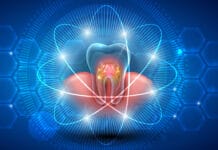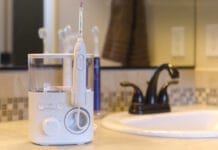When a person is clinically depressed, their dental hygiene may suffer; there is no doubt about that, but what about those who suffer from post-traumatic stress disorder (PTSD)? While PTSD may accompany depression, it also encompasses various other medical conditions.
PTSD is a mental condition that is triggered by a terrifying event and is one of the most common psychiatric illnesses in the United States. Symptoms can include nightmares, flashbacks, severe anxiety, sleep disorders, depression, and uncontrollable thoughts about the event(s). Headaches and facial and TMJ pain are early signs found in 88% of those with PTSD. Abrfraction, attrition, abrasion, and dentin loss are frequent findings in those who suffer from PTSD.
It has been established that those who suffer from PTSD show a high incidence of poor oral hygiene, rampant caries, multiple missing teeth, severe periodontal disease, and TMJ disorders. Xerostomia, changes in taste, glossitis, and gingivitis have also been found in patients with PTSD. Taking this further, the question arises, are the same findings seen in veterans who have experienced war and suffer from combat-induced PTSD?
Israeli researchers gathered war veterans who specifically suffer from combat-induced PTSD, or Ci-PTSD, to determine if their specific diagnosis causes disturbances in routine and the desire to care for one’s dental hygiene.
Oral and Dental Considerations of Combat-induced Post-traumatic Stress Disorder (PTSD)-A Cross-Sectional Study compares one hundred war veterans with Ci-PTSD to a control group of 103 non-military Israeli citizens without PTSD. The veterans were then separated into two groups, one taking psychiatric medication and the other consisting of those not being treated with psychiatric medications. It should be noted that the combat veterans taking psychiatric medication would not have been able to function in daily life without medication.
Ci-PTSD Results
All systemic diseases and conditions were recorded; though low incidence, the most common systemic disease in the study population was ischemic heart disease and diabetes mellitus.
Thorough oral examinations were analyzed, including full-mouth periodontal charting, occlusal analysis, and radiographic exams. Extraoral exams were interpreted, including TMJ function and pain. Intraoral exams included periodontal assessments, plaque index (PI), DMFt scores, intraoral hard and soft tissue pathologies, occlusal wear, and the number of implants present.
The results showed that the veterans with Ci-PTSD, especially those on medication, are in a much more precarious place regarding DMFt scores, a higher PI level, and every subject with the diagnosis had what is considered a poor dental status in general.
Severe periodontal disease (periodontitis) was found in 62.5% of patients in the veteran group who took medication compared to 21.7% in the non-medicated veteran group and 15.5% in the control group. The patients in the medicated group smoked significantly more than any other group.
This study determined that the reasons behind a person’s periodontal status are specifically related to three distinct characteristics:
- Neglected oral hygiene
- Decreased natural immunity
- Smoking habits
The results of the study seem redundant. We know that PTSD, tobacco use, and a lack of motivation regarding oral care are all risk factors for oral diseases. The results of this particular study indicate that our patients with Ci-PTSD are even more susceptible to periodontitis than people with PTSD diagnosis, which is not combat-induced. While almost all PTSD patients showed occlusal wear due to bruxism, 90% of those with combat-induced post-traumatic stress disorder had severe medication-induced parafunctional habits.
The DMFt status of the Ci-PTSD patients was actually double that of the control group.
This can lead to serious interventions that move beyond our chair into a surgeon’s office. This is the opposite of what we want.
Ci-PTSD Patient Care Conclusions
Many of our patients with PTSD, especially Ci-PTSD, suffer from anxiety that can keep them away from our chairs and our care. In this study, the individuals who suffered from Ci-PTSD and took medication had the poorest oral health of all studied patients; some needed immediate treatment.
Tobacco alters the immune response, which may lead to periodontitis. “However, the present study shows, for the first time, that despite the high percentage of smokers among PTSD patients, Ci-PTSD is an independent factor associated with severe periodontitis. This may be attributed to the altered immune response in PTSD patients that might affect the susceptibility to severe periodontal disease.”
In Closing
A difficult part of caring for people with psychological diagnoses is that you can’t look at someone and identify a problem based on what you see outright. There isn’t a noticeable scar, lesion, or broken bone. Though all patients require good rapport with a clinician, patients with PTSD may need to be even more comfortable and require more trust to be open about their current state of motivation regarding oral hygiene. It’s a hard subject to discuss, and dental clinicians aren’t trained therapists.
Patients with Ci-PTSD are a sensitive population in our society that needs more personal, supportive, and adequate care than they may be currently offered in the general healthcare system. Our ability to identify their needs and even anticipate the direction in which they are headed oral-health-wise can dramatically increase their quality of life. Dental hygienists are preventive health specialists, and we are perfectly positioned to prevent more serious problems in this patient population.
Study note: All citizens of Israel receive free dental care, so differences in socioeconomic status were not considered essential to the study.
Before you leave, check out the Today’s RDH self-study CE courses. All courses are peer-reviewed and non-sponsored to focus solely on high-quality education. Click here now.











